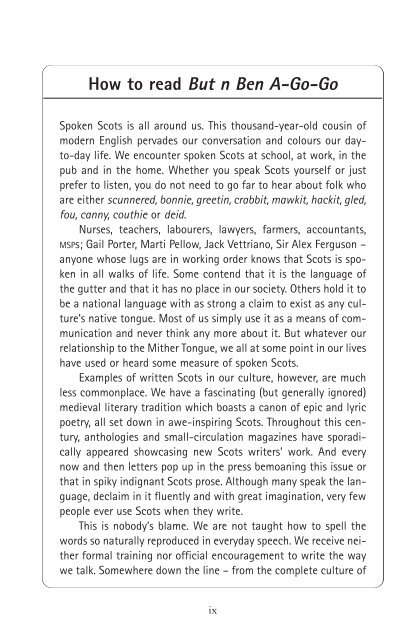But n Ben a Go Go by Matthew Fitt sampler
Written entirely in Scots, this is a science fiction novel set in a future where the Scottish Highlands are the only unsubmerged area of Britain. With strong characters and a gripping plot, the well-defined settings create an atmosphere of paranoia and danger. The exciting denouement has a surprising twist and is set on Schiehallion. The introduction includes a section on how to read the Scots in this book, Matthew has made the spelling as straightforward as possible for a population used to English spelling conventions.
Written entirely in Scots, this is a science fiction novel set in a future where the Scottish Highlands are the only unsubmerged area of Britain. With strong characters and a gripping plot, the well-defined settings create an atmosphere of paranoia and danger. The exciting denouement has a surprising twist and is set on Schiehallion. The introduction includes a section on how to read the Scots in this book, Matthew has made the spelling as straightforward as possible for a population used to English spelling conventions.
Create successful ePaper yourself
Turn your PDF publications into a flip-book with our unique Google optimized e-Paper software.
How to read <strong>But</strong> n <strong>Ben</strong> A-<strong>Go</strong>-<strong>Go</strong><br />
Spoken Scots is all around us. This thousand-year-old cousin of<br />
modern English pervades our conversation and colours our dayto-day<br />
life. We encounter spoken Scots at school, at work, in the<br />
pub and in the home. Whether you speak Scots yourself or just<br />
prefer to listen, you do not need to go far to hear about folk who<br />
are either scunnered, bonnie, greetin, crabbit, mawkit, hackit, gled,<br />
fou, canny, couthie or deid.<br />
Nurses, teachers, labourers, lawyers, farmers, accountants,<br />
MSPs; Gail Porter, Marti Pellow, Jack Vettriano, Sir Alex Ferguson –<br />
anyone whose lugs are in working order knows that Scots is spoken<br />
in all walks of life. Some contend that it is the language of<br />
the gutter and that it has no place in our society. Others hold it to<br />
be a national language with as strong a claim to exist as any culture’s<br />
native tongue. Most of us simply use it as a means of communication<br />
and never think any more about it. <strong>But</strong> whatever our<br />
relationship to the Mither Tongue, we all at some point in our lives<br />
have used or heard some measure of spoken Scots.<br />
Examples of written Scots in our culture, however, are much<br />
less commonplace. We have a fascinating (but generally ignored)<br />
medieval literary tradition which boasts a canon of epic and lyric<br />
poetry, all set down in awe-inspiring Scots. Throughout this century,<br />
anthologies and small-circulation magazines have sporadically<br />
appeared showcasing new Scots writers’ work. And every<br />
now and then letters pop up in the press bemoaning this issue or<br />
that in spiky indignant Scots prose. Although many speak the language,<br />
declaim in it fluently and with great imagination, very few<br />
people ever use Scots when they write.<br />
This is nobody’s blame. We are not taught how to spell the<br />
words so naturally reproduced in everyday speech. We receive neither<br />
formal training nor official encouragement to write the way<br />
we talk. Somewhere down the line – from the complete culture of<br />
ix


















